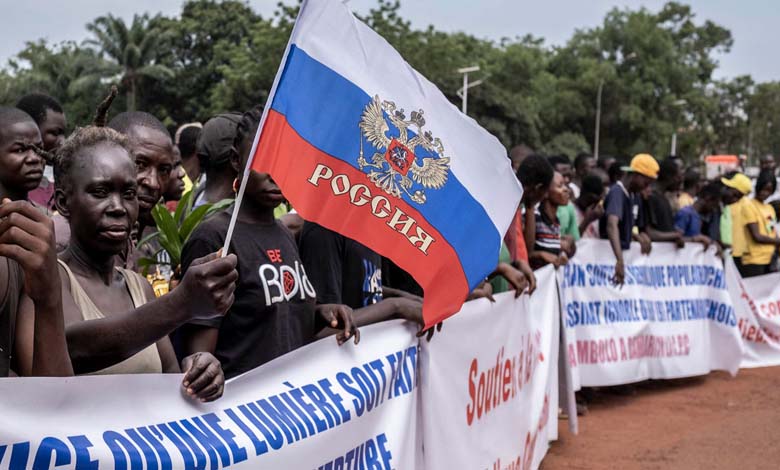Russia Expands Its Military Influence in Africa: A Threat to U.S. and U.K. Interests via Port Sudan Base

In recent years, Russia has taken accelerated steps to strengthen its military presence in Africa, posing an increasing threat to Western interests in the region, particularly those of the United States and the United Kingdom. The most notable of these steps is the establishment of a Russian naval base in Port Sudan, a strategic move to enhance Russian influence in the Red Sea—a vital corridor connecting the Mediterranean Sea and the Indian Ocean via the Suez Canal and the Bab el-Mandeb Strait. This military expansion in such a sensitive area reflects a shift in regional security dynamics and places additional pressure on Western powers seeking to maintain their dominance in the region.
-
With Weapons and Soldiers, the Russian Bear Strengthens Its Influence in the African Sahel
-
Broad Russian Diplomatic Engagement in Africa Paves the Way for Greater Influence
The Russian Naval Base in Port Sudan: Strengthening Influence in the Red Sea
Port Sudan, a Sudanese city on the Red Sea, is one of the world’s most strategic locations. Its proximity to the Bab el-Mandeb Strait—one of the most crucial maritime passages globally—grants Russia potential control over a key trade route. Controlling this passage enhances Russia’s ability to influence global trade flows, presenting a major challenge to the United States and the United Kingdom, whose economies heavily rely on securing these maritime routes.
Russia’s growing military power in the Red Sea directly threatens maritime freedom in the region, a highly sensitive issue for US national security. With a naval base in Port Sudan, Russia can monitor Western military activities in the area, complicating US and allied naval operations in this vital region.
-
Russia Activates “Soft Power” in Africa
-
Observatory: Russia Transferred Syrian Officers to a Base in North Africa
The Russian Base in Sudan: A Threat to US National Security
The presence of a Russian naval base in Port Sudan threatens security stability in the Red Sea, exacerbating the challenges faced by the United States and its allies. This Russian military presence enables Moscow to expand its military operations in the region, further complicating navigation freedom in the Red Sea—a critical passage for global trade. Moreover, Russia could use the base for intelligence operations, monitoring US and UK military activities in the Red Sea and the Middle East, posing a direct threat to US national security.
The naval base also provides Russia with an opportunity to collaborate with governments and regimes in Africa and the Middle East, including unstable administrations that could offer strategic support to Moscow. Such cooperation could lead to new threats to Western interests, as Russia may find opportunities to expand its military and political influence in the region at the expense of US and UK interests.
-
With the “African Initiative,” Russia Strengthens Its Influence in Burkina Faso
-
The race for Africa… The rivalry between the US and Russia intensifies in the Central African Republic
A Threat to Western Power in Africa and the Middle East
Russia’s military expansion in Sudan reflects growing tensions between Moscow on one side and the US and UK on the other, in a race for influence in Africa and the Middle East. As the US and UK scale back their military engagement in certain African countries, Moscow seeks to fill the strategic vacuum by strengthening its ties with both strong and unstable regimes.
The agreement between Sudan’s Burhan-led military and Russia solidifies Moscow’s presence in the region at a time when Western powers are working to curb Russian and Chinese influence on the continent. This military expansion is expected to strengthen Russia’s foothold in the region, making it increasingly difficult for Western powers to maintain their strategic interests.
-
Russia Maintains Positive Neutrality on Western Sahara Issue to Boost African Interests
-
The Last Base Extinguished… Côte d’Ivoire Deepens France’s Losses in Africa
The Russian-Sudanese Alliance: A Threat to Regional Stability
The military cooperation between Russia and Sudan adds pressure on regional stability. These alliances could provide Russia with a platform to supply armed groups in Africa and the Middle East with weapons and military equipment, further destabilizing the region. Additionally, collaboration with non-democratic regimes raises Western concerns over human rights violations and the growing influence of authoritarian systems.
Threats of the Russian Base to the Global Economy and Energy Security
It is crucial to note that Russia’s military expansion in Port Sudan could significantly impact global economic security. The Red Sea is a key transit route for oil and gas shipments between the Middle East and global markets. Any disruption to trade flows in this region could lead to reduced energy supplies and increased oil and gas prices, harming Western economies.
-
Armed groups deliberately kidnap Europeans in the African Sahel: What are their motives?
-
Political Events Awaiting Africa in 2025
If Russia manages to establish dominance over Port Sudan, Western energy markets could find themselves in a precarious position. This expansion could also heighten pressures on global energy prices, exacerbating economic challenges for Western nations.
Russia’s military expansion in Africa, particularly in the Red Sea through the Port Sudan base, presents a major strategic challenge to Western interests in the region. This expansion threatens regional stability, directly impacts US and UK national security, and has potential consequences for the global economy and energy security. The United States and its allies must act swiftly and cautiously to protect their interests in this vital region by strengthening regional alliances and increasing pressure on Russia to halt its military expansion.












